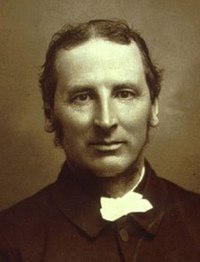Edwin Abbott Abbott
Edwin Abbott Abbott (born December 20, 1838 in Marylebone / London , † October 12, 1926 in Hampstead / London) was an English school director, theologian and writer. He became known for his mathematical satire Flatland from 1884.
life and work
Abbott attended the City of London School and St John's College , Cambridge , where he studied classical philology, mathematics and theology with honors and became a fellow of the college. He was ordained in 1862. In 1865, when he was only 26 years old, he became the headmaster of the City of London School . In 1876 he was a Hulsean lecturer .
Abbott retired in 1889 and devoted himself to literary and theological endeavors. Abbott's liberal approach to theology was evident in his books and lectures. His Shakespeare grammar from 1870 is a lasting contribution to English philology. In 1885 he published a biography on Francis Bacon . His theological writings also include three anonymously published religious romance novels: Philochristus (1878), Onesimus (1882) and Sitanus (1906). In 1913 he became a Fellow of the British Academy .
Important contributions were his theological discourses The Core and the Shell (1886), Philomythus (1891), his book The English Career of Cardinal Newman (1892) and his article The Gospels in the ninth edition of the Encyclopædia Britannica , in which he took a critical position which caused noticeable excitement in the English theological world. Other works were St. Thomas of Canterbury , His Life and Miracles (1898), Johannine Vocabulary (1905) and Johannine Grammar (1906).
Abbott died of flu in 1926 and is buried in the cemetery in Hampstead, London.
literature
- John Clute : Abbott, Edwin A. In: John Clute, Peter Nicholls : The Encyclopedia of Science Fiction . 3rd edition (online edition), version dated April 4, 2017.
- George Mann : The Mammoth Encyclopedia of Science Fiction. Robinson, London 2001, ISBN 1-84119-177-9 , p. 29.
- Daniel Tibi: Edwin A. Abbott. In: Biographisch-Bibliographisches Kirchenlexikon (BBKL). Volume 34, Bautz, Nordhausen 2013, ISBN 978-3-88309-766-4 , Sp. 1-4.
Web links
- Literature by and about Edwin Abbott Abbott in the catalog of the German National Library
- Edwin Abbott Abbott in the Internet Speculative Fiction Database (English)
- Edwin Abbott Abbott in the Internet Movie Database (English)
- John J. O'Connor, Edmund F. Robertson : Edwin Abbott Abbott. In: MacTutor History of Mathematics archive .
- Biography (English)
| personal data | |
|---|---|
| SURNAME | Abbott, Edwin Abbott |
| BRIEF DESCRIPTION | English school director, theologian and writer |
| DATE OF BIRTH | December 20, 1838 |
| PLACE OF BIRTH | Marylebone , London |
| DATE OF DEATH | October 12, 1926 |
| Place of death | Hampstead , London |
